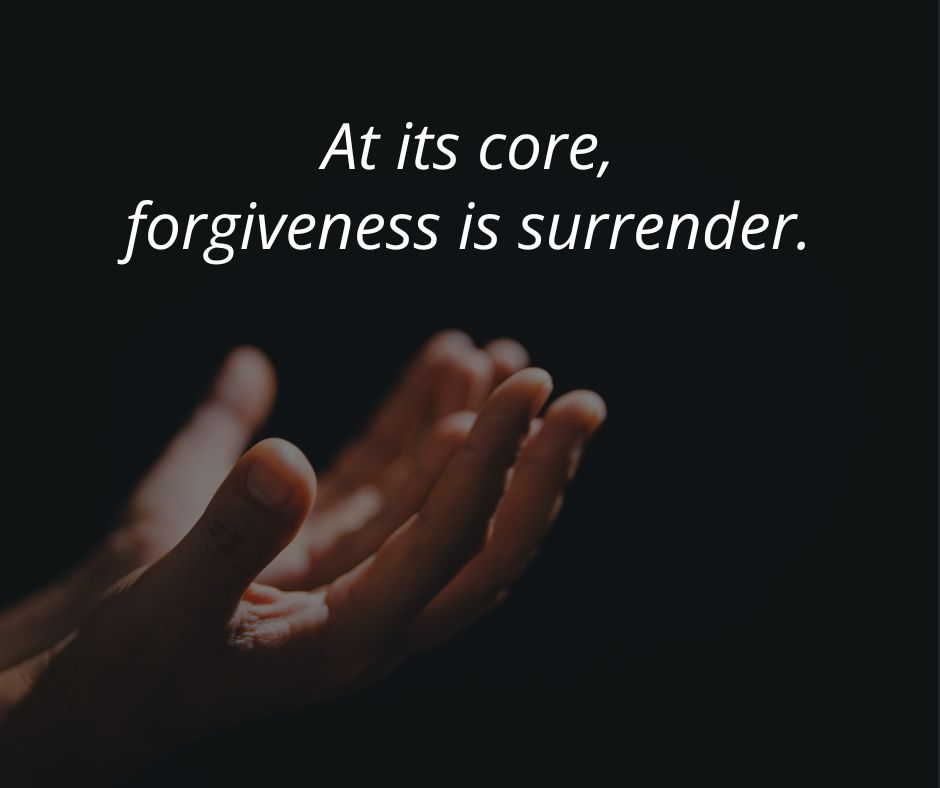Help! I'm Not Good at Forgivenessنموونە


In American culture, we have a phrase—“a four-letter word”—because several profane words are four letters in length.
The fourth attitude that forgiveness builds in us is a tricky word. It may not be four letters in length, but it’s a word that many avoid. That word is surrender.
When we experience God's forgiveness, we are led to surrender our lives to Him. In Romans 12, the Apostle Paul urges his readers to offer their bodies as living sacrifices to God in light of God’s great mercy toward them.
Many of us view surrender as a weakness or giving up. If I surrender in a battle, I'm saying you're stronger than me, or I don't have any fight left. But surrender isn’t always a bad thing. After all, my favorite definition of forgiveness is "giving up my pursuit of revenge and trusting God to bring justice." At its core, forgiveness is surrender. We let go of our desire to get even or to hurt the person the way they hurt us.
After watching the Amish Grace clip I described on day one, I watched a news report broadcast on the 10th anniversary. Journalists returned to Lancaster County people and explored untold stories from “The Happening.”
In the days after the shooting, financial donations flooded into Lancaster County from all over the country. Many people wanted to help the five families of the girls who had been killed, along with five other families whose daughters had been wounded.
Surprisingly, those Amish families took a large portion of the donated money and funneled it to the widow and children of the shooter. I didn’t see that detail coming!
The journalist interviewed a local college professor who studied the Amish his whole career. The professor recounted a conversation with an Amish man named Abner. The professor asked Abner, “How do you define forgiveness?” Abner replied, “Forgiveness is giving up my right to revenge.”
Unbelievable! We have the right to revenge, but we don't have to cling to that right. We can lay it down to forgive and find freedom.
Whether in the aftermath of a tragedy that makes national news or in your corner of the world, it’s abnormal to forgive. Our natural human inclination is to seek revenge. But if you want to be free from pain, forgiveness is the path to freedom. Claiming your right to revenge doesn't destroy them—it destroys you! Forgiveness is a choice that opens up our freedom.
Perhaps you’ve been trying to get over this wound on your own. Can I ask you a question about that? If you were going to forgive them alone, wouldn’t you have done so by now?
You and I need God’s power to forgive! When we embrace God’s forgiveness and allow it to transform how we see the world, His forgiveness creates four attitudes we couldn’t form ourselves. God’s grace builds humility, empathy, mercy, and surrender in our hearts. We discover that forgiven people can forgive. What seemed impossible on your own is possible with God.
It’s been an honor to share this challenging topic from God's word with you. I’d love to continue encouraging you and help you take your next steps in this area! Click here for complimentary access to my Help! I’m Not Good at Forgiveness Action Plan, including a tool that significantly increased my capacity to forgive the deep hurt I’d experienced in the church.
کتێبی پیرۆز
دەربارەی ئەم پلانە

Forgiveness is not easy, and many of us struggle with it. How do we get better at forgiving? This plan unpacks Jesus' most famous teaching on forgiveness and four key attitudes He builds in us as we accept His forgiveness ourselves. If you're not good at forgiveness, this is the plan for you!
More








